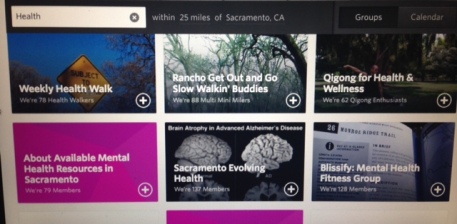Ever wanted to meet or network with people that share your same interests but don’t know where to start? Make sure to get connected to the following 3 social media networking tools.
LinkedIn, Meetup and Facebook are social networking tools that provide a platform for like-minded professionals to share information, collaborate and build communities of practice allowing discussion of current topics such as industry latest news, trends and market data.
What are communities of practice?? Communities of practice are a group of people who converse about some shared task or topic in order to get better at it. 1
LinkedIn:
LinkedIn groups provide a place to share content, find answers and improve dissemination of research. You can either join a group or start your own group. Is very easy to create a LinkedIn account and to join a group. I suggest the following tutorials:
Lynda LinkedIn tutorials: http://www.lynda.com/LinkedIn-tutorials/Up-Running-LinkedIn/383249-2.html
How to join LinkedIn groups: https://www.youtube.com/watch?v=tWcmG6XwDvk
For public health professionals I recommend the following groups: Public Health Institute, American Public Health Association, Health Communications, Health Literacy and Social Scientists Group.
You can also follow the LinkedIn speaker series in YouTube: https://www.youtube.com/results?search_query=LinkedIn+speaker+series
The book Social Media for Social Good2 includes a section on how LinkedIn groups are also great tool to promote non-profits. A best practice for non-profits is to think about a group name that will help build interest and avoid narrowing the scope of conversation.
Facebook groups:
Another platform to share information and learn from other professionals in the field of health is Facebook groups.
In a survey conducted in September 2014, the Pew Research Center finds that Facebook users continue to be very active. Fully 70% of users engage with the site daily. This means is very likely for users to respond to your post, comment or questions in a timely manner.
Meetup:
Looking for ways to be connected with others in your local community? Check out meetup http://www.meetup.com
This networking tool helps you meet people in your local community that share your same interests. I conducted a quick search in my area and found many health related groups. This networking tool is an alternative for those who prefer the face-to-face interaction.
Blog References:
1 Clay Shirky (2008). Here Comes Everybody. Penguin Books, New York.
2 Heather Mansfield (2012). Social Media for Social Good: A How-To Guide for Nonprofits. McGraw-Hill, New York.





Reblogged this on Nallely Ortiz.
Thanks for sharing this post which was content rich and useful information. The images you chose were supportive of the content too.
I was unfamiliar with Meetup but an interesting addition to social networking since it links most directly between online and in life networks. I had only considered it as a social or activity tool but as you point out it has great potential for health related groups and peer support and information exchange. I wonder whether services such as this works as well in rural areas where the distances covered have to be much greater?
The LinkedIn video series was also new to me. I noticed that they’ve recently begun local editions of the video series, in a similar way to the TEDtalk structure. Here is a link to the San Francisco version. http://youtu.be/kmaN0qGMswE
I couldn’t see find out how they selected their speakers but I wonder if they plan to develop profession focused video channels in the future.
In terms of structuring your blog post I had a formatting suggestion. If you could embed your YouTube links within the post, displaying text, rather than the link itself (not sure if I use the correct technology but hopefully you know what I mean). That would help reduce the distracting text links.
Nice job.
Dear Ms. Ortiz,
Here are my thoughts after reading your post:
1. A phrase “communities of practice” was introduced in the very beginning in the post, which was the key concept for your post. While you did concisely define what this phrase meant (which was good), I felt this important concept could have been further elaborated to truly connect with the three social networking tools that you used as examples to bring like-minded professionals together to discuss topics/subjects that they are passionate about.
2. For each of the three specific social networking tools, it would have been more effective to illustrate your “communities of practice” concept if you had included a specific example/nonprofit organization using that particular social networking tool in bringing experts/professionals in a field together to achieve a common goal or even just to discuss a current event that impacts the field. Since now we are working on health-related issues, I think the most appropriate nonprofit health care groups to include would be cancer patient support groups, HIV patient support group, and rare medical condition support groups (which also can bring awareness of these rare medical conditions to the general public).
3. When including a specific support group, consider capturing their Facebook page (for example) to show their “face” as well as to list some of the events/projects that they are working on so as to attract more experts/health care professionals to possibly join their efforts in reaching out to more people. (After all, we are public health practitioners.) I think this might fit into the theme of your post “building community.”
Sincerely,
Clipper Young
Good job, Nallely, and thanks also for the link to your blog! What stood out for me is the idea of communities of practice and what that would look like and mean for public health and healthcare. Like Clipper mentioned, would’ve liked a little more depth here, as it mirrored the overall ethos of connecting with likeminded people to learn, share information, network. Check out these resources the CDC and HRSA have put together in this area for some food for thought: http://www.cdc.gov/phcommunities/ and http://www.hrsa.gov/communitiesofpractice/